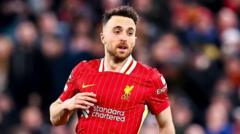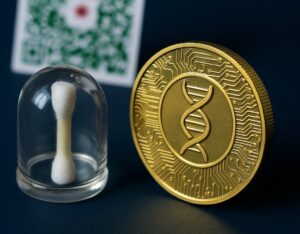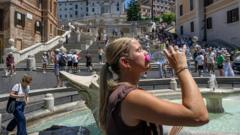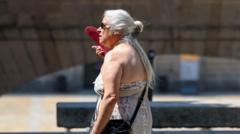Scientists are on the brink of uncovering the mystery of Christopher Columbus's origins, with a documentary set to reveal new findings. DNA samples, collected in 2003 from bones believed to belong to Columbus, his son Hernando, and brother Diego, have been analyzed to compare his genetic makeup with that of historical figures from various regions. Though mainstream history suggests Columbus hailed from Genoa, claims of his birth have varied widely. Early results confirm the remains in Seville are indeed his; however, the true birthplace remains under scrutiny, with the documentary set to challenge established theories.
Unraveling Columbus: DNA Study Sets to Redefine His Origins
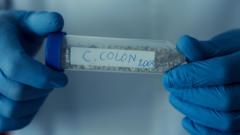
Unraveling Columbus: DNA Study Sets to Redefine His Origins
A groundbreaking DNA analysis is poised to unravel the true origins of Christopher Columbus, challenging long-held beliefs about the explorer's birthplace.
DNA samples were taken in 2003 from the bones of Columbus—known in Spanish as Cristóbal Colón—and his son Hernando. More than five centuries after he reshaped history by opening up the New World to European exploration, scientists say they are ready to reveal the truth about the origins of Christopher Columbus. The explorer reached the Americas in 1492 with the support of the Spanish Crown. However, mainstream history books claim he was native to Genoa, leaving his provenance in dispute. Various regions and countries have claimed him as their own. Now, after over two decades of research, scientists are equipped with evidence to settle the debate on Columbus's birthplace.
In 2003, José Antonio Lorente, professor of forensic medicine at Granada University, and historian Marcial Castro exhumed what were believed to be the remains of Columbus from Seville Cathedral to take DNA samples. They also took DNA from his son, Hernando, and brother, Diego. Since then, they have compared his DNA with historical figures from various countries using technological advancements to ensure result accuracy.
Ahead of RTVE's broadcast of a documentary, "a documentary thriller," the forensic team has confirmed the remains in Seville to be those of Columbus. The Dominican Republic has long claimed to host his body, dedicating a mausoleum to him in Santo Domingo. However, the team acknowledges some remains may be in the Dominican Republic, which did not participate in the project.
The widely accepted theory is that Columbus was born in Genoa in 1451 to a family of wool weavers. In 1492, he led an expedition backed by Spain’s Catholic Monarchs seeking to establish a route to the Far East. Instead, he reached the Caribbean, initiating European contact with the Americas, leading to conquest, settlement, and the mass death of indigenous people from diseases and war. Columbus died in 1506 in Valladolid, Spain.
Prof Lorente’s team narrowed down his birthplace to eight possibilities, in Spain, Portugal, or Italy. Columbus's DNA was compared with individuals believed to be his relatives. On the shortlist are regions like north-western Spain’s Galicia, Mallorca—proposing Columbus as the illegitimate son of the prince of Viana—and the Spanish Mediterranean port city of Valencia with his supposed secret Jewish ancestry.
Claims also come from Navarre and Castilla-La Mancha in Spain, and from Portugal, proposing Columbus was a nobleman-pirate named Pedro de Ataíde. RTVE's documentary is set to "revolutionize everything studied" about Columbus. Yet Marcial Castro, involved in the study, hints at backing the "traditional Genovese theory" as most plausible. Prof Lorente stated that recent data continue to be analyzed to hold scientific significance, with full results by November.
The program, Colón ADN: Su verdadero origen (Columbus’s DNA: His true origins), airs on Spain’s TVE 1 Saturday at 22:30 (20:30 GMT), promising to shed light on Columbus's true origins.
In 2003, José Antonio Lorente, professor of forensic medicine at Granada University, and historian Marcial Castro exhumed what were believed to be the remains of Columbus from Seville Cathedral to take DNA samples. They also took DNA from his son, Hernando, and brother, Diego. Since then, they have compared his DNA with historical figures from various countries using technological advancements to ensure result accuracy.
Ahead of RTVE's broadcast of a documentary, "a documentary thriller," the forensic team has confirmed the remains in Seville to be those of Columbus. The Dominican Republic has long claimed to host his body, dedicating a mausoleum to him in Santo Domingo. However, the team acknowledges some remains may be in the Dominican Republic, which did not participate in the project.
The widely accepted theory is that Columbus was born in Genoa in 1451 to a family of wool weavers. In 1492, he led an expedition backed by Spain’s Catholic Monarchs seeking to establish a route to the Far East. Instead, he reached the Caribbean, initiating European contact with the Americas, leading to conquest, settlement, and the mass death of indigenous people from diseases and war. Columbus died in 1506 in Valladolid, Spain.
Prof Lorente’s team narrowed down his birthplace to eight possibilities, in Spain, Portugal, or Italy. Columbus's DNA was compared with individuals believed to be his relatives. On the shortlist are regions like north-western Spain’s Galicia, Mallorca—proposing Columbus as the illegitimate son of the prince of Viana—and the Spanish Mediterranean port city of Valencia with his supposed secret Jewish ancestry.
Claims also come from Navarre and Castilla-La Mancha in Spain, and from Portugal, proposing Columbus was a nobleman-pirate named Pedro de Ataíde. RTVE's documentary is set to "revolutionize everything studied" about Columbus. Yet Marcial Castro, involved in the study, hints at backing the "traditional Genovese theory" as most plausible. Prof Lorente stated that recent data continue to be analyzed to hold scientific significance, with full results by November.
The program, Colón ADN: Su verdadero origen (Columbus’s DNA: His true origins), airs on Spain’s TVE 1 Saturday at 22:30 (20:30 GMT), promising to shed light on Columbus's true origins.



